Accident and Incident Investigation
Quantity: 1

Duration 2 hours
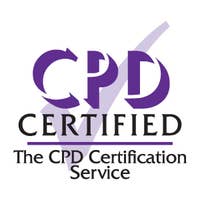


100% online training
Start when you like
Learn on any device (desktop, mobile or tablet)
Instant assessment and result
1 learner per course
Train teams of all sizes
Bulk discounts starting at 10% off 10 courses
Pay by invoice with 30 day payment terms available (5+ courses)
Includes a 10% discount for 10+ courses
This Accident and Incident Investigation Training course provides learners with an introduction to effective accident and incident investigation. It establishes the importance and key principles of accident and incident investigation, including what kind of adverse events might be investigated and the roles within an investigating team. The course considers what immediate responses might be appropriate following an adverse event and then provides learners with a four-step process for carrying out investigations.
The first step covers what types of information should be gathered, in order to inform any investigation. The course then goes on to look at analysing that information, considering both potential root and underlying causes of adverse events. It then explores how to effectively use the analysis to identify risk control measures, in order to ensure lessons are learnt from any adverse event. Finally, it considers best practices in terms of producing and implementing risk control action plans, as well as how to ensure effective communication of investigation findings, alongside processes for ongoing monitoring and reviewing of actions.
100% online training
Access anywhere
Same day digital certificate
Printed certificate posted next working day
Full audio voiceover
Assessment retakes at no extra cost
Developed by health and safety professionals
Accredited by CPD and assured by RoSPA Qualifications
Bulk discount for orders of 10+ courses
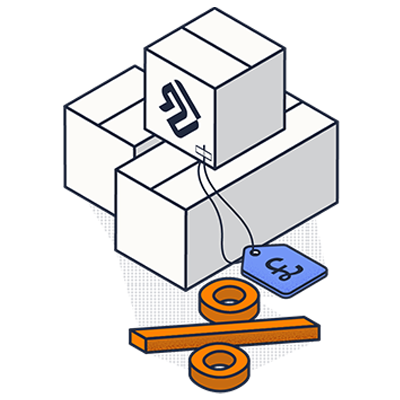
Save on our courses when you buy more training upfront. Lock in a better price now and access the training whenever you need to. You can mix and match any of our courses too and get the discount off your whole order.
10+ courses = 10% off
50+ courses = 20% off
100+ courses = 30% off
500+ courses = 40% off
On completion of this course, learners will understand:
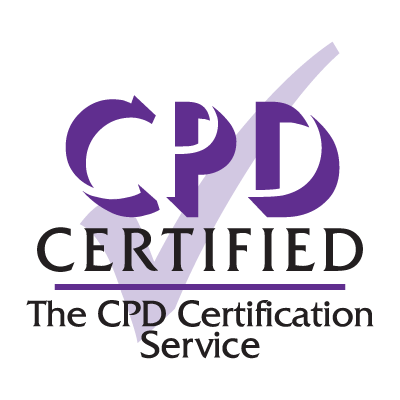
Accredited by CPD
All of our courses are accredited by the CPD Certification Service as conforming to universally accepted Continuing Professional Development (CPD) guidelines.
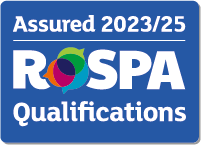
Assured by RoSPA Qualifications
This course is also assured by the Royal Society for the Prevention of Accidents through their RoSPA Qualifications Assurance System, as providing up-to-date, quality and content-approved training.
Recommended renewal:
3 years
What does this mean? This certificate does not have an expiry date, however, based on industry best practice guidelines there is a recommended renewal period.
Our in-house Learning Designers develop all of our courses to give you and your learners the most engaging training possible.
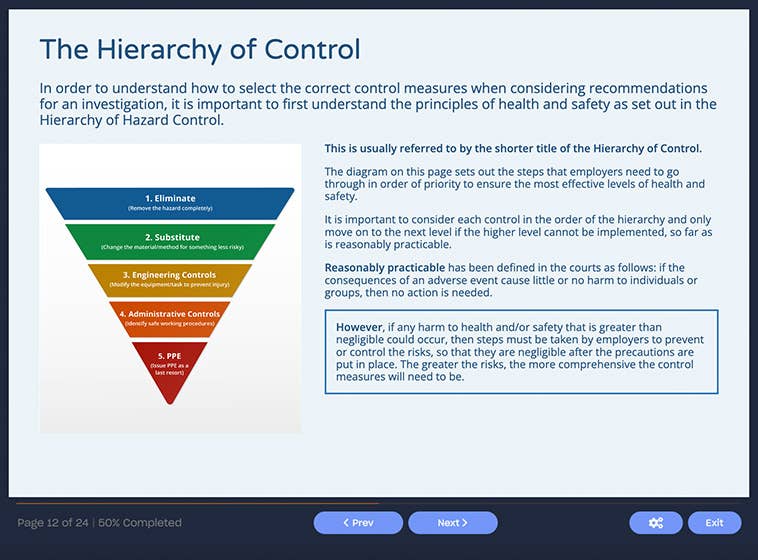
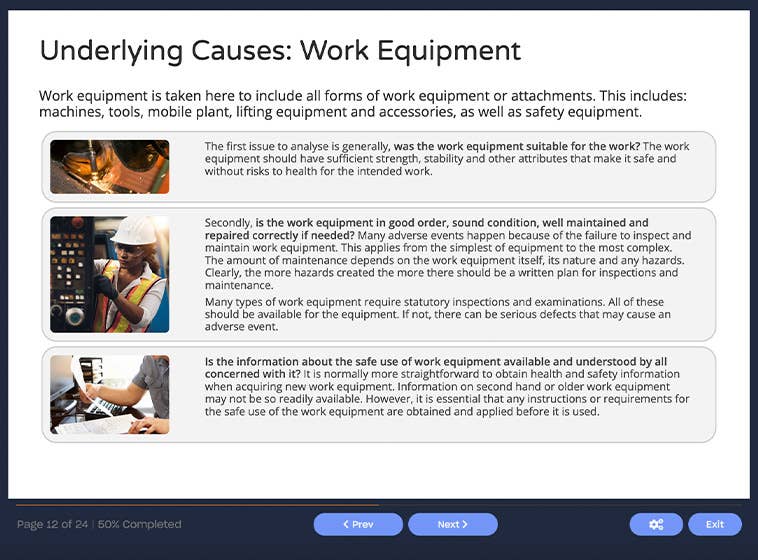
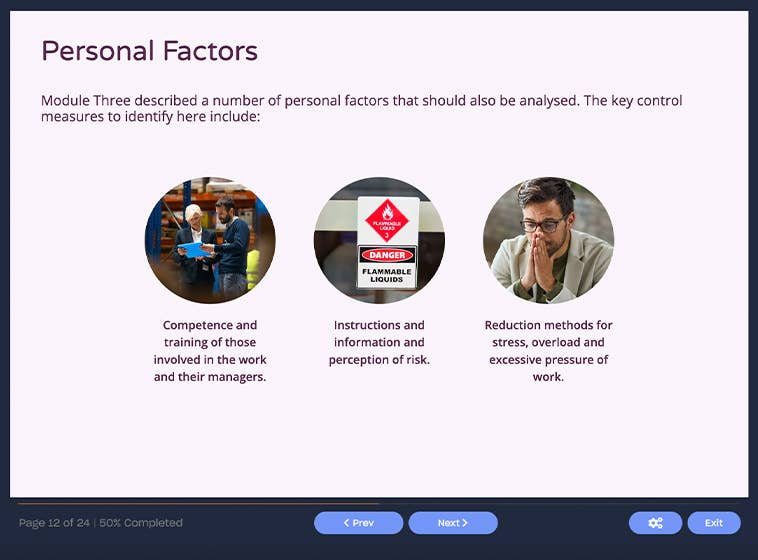
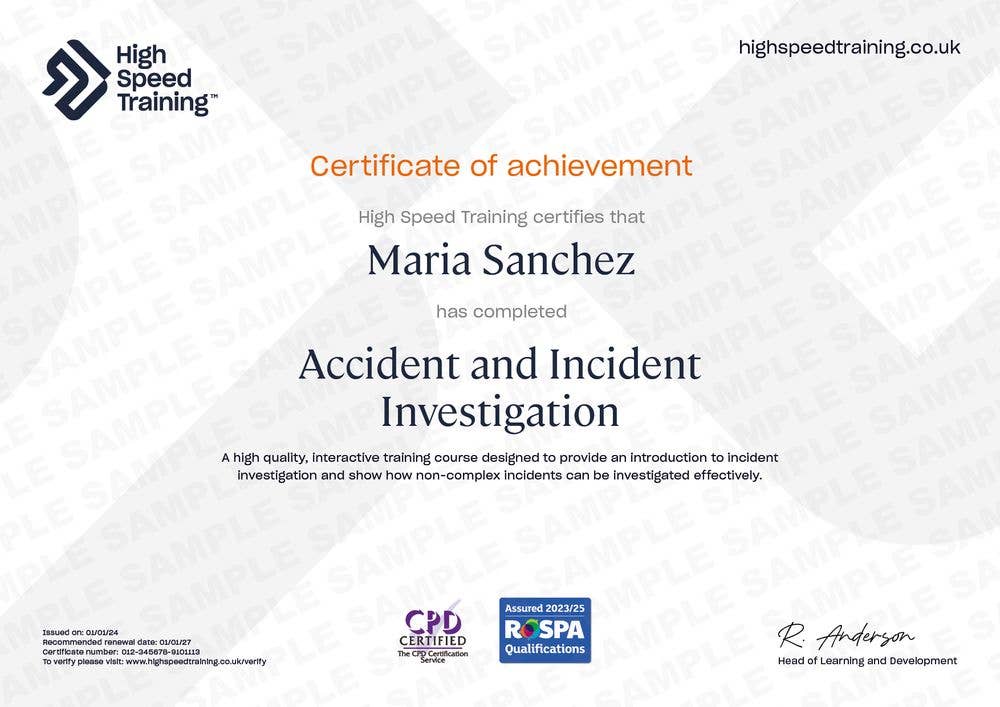




What are adverse events, what causes adverse events, what is accident and incident investigation and who is involved, the importance and benefits of accident and incident investigation, which accidents and incidents should be investigated, ensuring health and safety immediately after an accident or investigation, timescales and conduct of investigations, the four steps of successful investigations, step 1: information gathering, step 2: analysis of the information gathered, step 3: identifying risk control measures, step 4: drawing up and implementing action plans and the Hierarchy of Control.
Treatment of injuries and making areas safe, sharing information and immediate lessons, notifying others and recording information, who should carry out the investigation, step 1: information gathering, what happened, when and to whom, how did the adverse event happen, working conditions, case study, safe systems of work and working procedure, injuries and ill health, information gathering, management and supervision, information, instruction and training, maintenance and good housekeeping, provision and use of health and safety equipment, additional work factors.
The role of the investigation team, determining the immediate and underlying causes of accidents, underlying causes: general working conditions, safe access and safe places of work, work equipment and supervision and communication, determining root causes: organisational factors, the health and safety management system, leadership, responsibilities and training, design and planning, management of change, communications and emergency responses, determining root causes: job factors, risk assessments, safe systems of work and resources for health and safety, provision and maintenance of work equipment, management of health hazards and emergency procedures and determining root causes: personal factors, competence, training, information and instructions, excessive demands, fatigue and stress and errors, mistakes, violations and perceptions of risk.
Organisational factors, organisational factors - case study, job factors, managerial and supervisory competence, suitability, use, cleaning, maintenance and repair of work equipment and materials, managing health risks, work environment, resources and emergency procedure, personal factors, competence and training, instructions, information and perception of risk, reducing stress, overload and excessive pressure of work, implementing actions, the risk control action plan and other key actions from risk control action plans.
The online assessment is taken on completion of the training material. You will be asked 20 multiple-choice questions with a pass mark of 80%. The answers are marked automatically so you will instantly know whether you have passed. If you don't pass, don't worry! You can take the test as many times as you need with no extra charge.
This Accident and Incident Investigation course is suitable for all managers and supervisors who are responsible for implementing and monitoring risk control measures at work. It is suitable for a wide range of industries.

In partnership with
Neil Murray
Health and Safety Consultant
Neil Murray is a vastly experienced and highly qualified health and safety professional who has held roles such as Senior Health and Safety Executive inspector, and Principal Inspector for Channel Tunnel construction. He has also held senior roles in an international infrastructure business, a major UK water utility company and a major construction group and provided management consultancy to numerous companies across a wide range of industries.
Neil has a wide expertise in many sectors, including construction, civil engineering, manufacturing engineering, water and waste utilities, education, heritage sites, public safety, rail construction and operation, transport, marine, waste management, engineering design and industrial and facilities management services.
Neil is a QSA auditor for RoSPA and also an author of published guidance on health and safety in the construction of the Channel Tunnel, work at height, major project management, and online training courses.